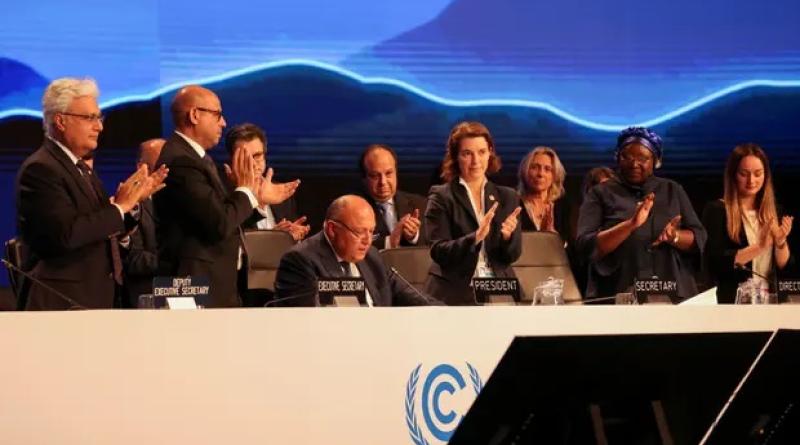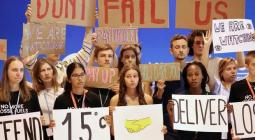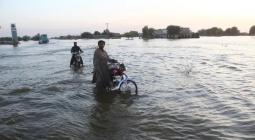‘We can do the impossible’: how key players reacted to end of Cop27 climate summit

World leaders, diplomats and activists respond to signing of ‘historic’ deal as climate talks wrap up
World leaders, diplomats, activists and experts have been reacting to the end of the Cop27 climate conference, which produced a groundbreaking agreement on climate finance for poorer countries but failed to make significant progress on many other matters. Here are some of the reactions from major players.
Laurence Tubiana, one of the architects of the landmark Paris agreement
“This Cop caused deep frustrations but it wasn’t for nothing. It achieved a significant breakthrough for the most vulnerable countries. The loss and damage fund, a dream at Cop26 last year, is on track to start running in 2023. There is a lot of work still to be done on the detail, but the principle is in place and that is a significant mindset shift as we deal with a world in which climate impacts cause profound loss.
“The influence of the fossil fuel industry was found across the board. This Cop has weakened requirements around countries making new and more ambitious commitments. The text makes no mention of phasing out fossil fuels and scant reference to science and the 1.5C target. The Egyptian presidency has produced a text that clearly protects oil and gas petrostates and the fossil fuel industries. This trend cannot continue in the United Arab Emirates next year.
“Elsewhere in Sharm el-Sheikh, it was a silent and fearful Cop for many activists. The legacy of those fighting for civic space and human rights will endure.”
Mary Robinson, chair of The Elders group of statespeople
“In a year of multiple crises and climate shocks, the historic outcome on loss and damage at Cop27 shows international cooperation is possible, even in these testing times. Equally, the renewed commitment on the 1.5C global warming limit was a source of relief.
“However, none of this changes the fact that the world remains on the brink of climate catastrophe. Progress made on mitigation since Cop26 in Glasgow has been too slow. Climate action at Cop27 shows we are on the cusp of a clean energy world, but only if G20 leaders live up to their responsibilities, keep their word and strengthen their will. The onus is on them. All climate commitments must be transformed into real-world action, including the rapid phase-out of fossil fuels, a much faster transition towards green energy, and tangible plans for delivering both adaptation and loss and damage finance.
“We avoided backsliding and made progress in Sharm el-Sheikh. Now leaders must stop sidestepping and fulfil their promises to safeguard a livable future.”
John Kerry, Joe Biden’s climate envoy
Kerry said the US was “pleased” to support the new fund, after the Americans gained assurances that there would be no legal liability for climate damages suffered by other countries.
“The fund, which will be one among many available avenues for voluntary funding, should be designed to be effective and to attract an expanded donor base,” he said in his closing statement, a nod to other countries the US expects to step up and perhaps a tacit acknowledgment that America has failed to meet previous promises to itself deliver climate finance.
Despite the lack of more ambitious language to cut emissions in the Cop27 text, Kerry was upbeat, saying that “make no mistake: we have kept the hope of 1.5 alive”.
Ursula von der Leyen, head of the EU executive
Von der Leyen described the Cop27 deal as “a small step towards climate justice”, but said much more was needed for the planet.
“We have treated some of the symptoms but not cured the patient from its fever,” she said in a statement. “I am pleased that Cop27 has opened a new chapter on financing loss and damage, and laid the foundations for a new method for solidarity between those in need and those in a position to help. We are rebuilding trust.
“Cop27 has kept alive the goal of 1.5C. Unfortunately however, it has not delivered on a commitment by the world’s major emitters to phase down fossil fuels, nor new commitments on climate mitigation.”
Vanessa Nakate, climate justice activist from Uganda
“Cop27 was meant to be the ‘African Cop’ but the needs of African people have been obstructed throughout. Loss and damage in vulnerable countries is now unignoreable, but some developed countries here in Egypt have decided to ignore our suffering. Young people were not able to have their voice heard at Cop27 because of restrictions on protest, but our movement is growing and ordinary citizens in every country are starting to hold their governments accountable on the climate crisis at home.”
Kathy Jetnil-Kijiner, climate envoy from the Marshall Islands
“I’m proud I got to be here to witness this happen and contribute in a small way. Worn out but so worth it to protect already disappearing islets, shorelines and culture. So many people all this week told us we wouldn’t get it. So glad they were wrong.
“I wish we got fossil fuel phase-out. The current text is not enough. But we’ve shown with the loss and damage fund that we can do the impossible. So we know we can come back next year and get rid of fossil fuels once and for all.”
Ani Dasgupta, president of the World Resources Institute
“In a historic breakthrough, wealthy nations have finally agreed to create a fund to aid vulnerable countries that are reeling from devastating climate damages. This loss and damage fund will be a lifeline for poor families whose houses are destroyed, farmers whose fields are ruined, and islanders forced from their ancestral homes. This positive outcome from Cop27 is an important step toward rebuilding trust with vulnerable countries.”
Mohamed Adow, director of the Power Shift Africa thinktank
“To quote the Three Lions England football song, after 30 years of hurt, climate action is finally coming home on African soil here in Egypt.
“At the beginning of these talks, loss and damage was not even on the agenda, and now we are making history. It just shows that this UN process can achieve results, and that the world can recognise the plight of the vulnerable must not be treated as a political football. It’s worth noting that we have the fund but we need money to make it worthwhile. What we have is an empty bucket. Now we need to fill it so that support can flow to the most impacted people who are suffering right now at the hands of the climate crisis.
“However, on a global fossil fuel phase-down, it’s sad to see countries just copying and pasting the outcome from last year’s Cop26 in Glasgow. The science is clear, the impacts are getting worse and we know that renewables are the future. Polluting countries need to leave coal, oil and gas in the ground if we’re going to keep global heating from running out of control.”
Meena Raman, director of Third World Network and adviser to developing countries at Cop27
“Since the EU and Alok Sharma are disappointed that fossil fuel phase-out is not in the text, we would like them to take leadership and revise their NDCs [nationally determined contributions] and put into plans their fossil fuel phase-out urgently and stop expansion of fossil fuels including oil and gas. [It’s] not enough to play to the gallery but act if they really want to save the planet and not hide behind 2050 net zero targets, which will bust the remaining carbon budget for 1.5C. They have the historical responsibility to get to real zero and in fact negative emissions and not net zero by 2050.”
COVER PHOTO: Delegates applaud as Cop27 president Sameh Shoukry delivers a statement during the closing plenary at the climate summit in Red Sea resort of Sharm el-Sheikh on Sunday. Photograph: Mohamed Abd El Ghany/Reuters





